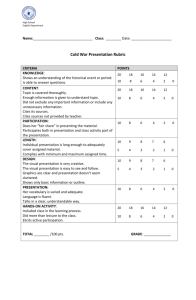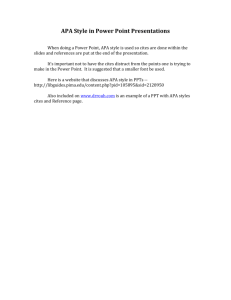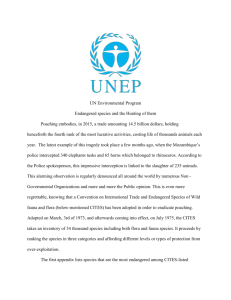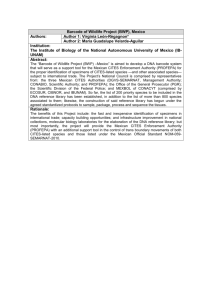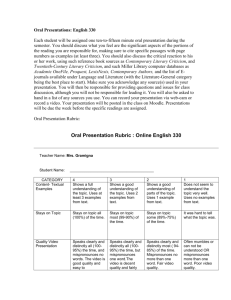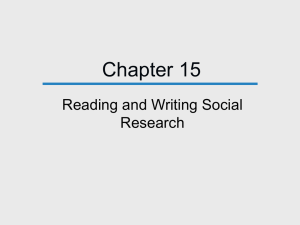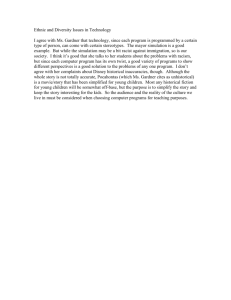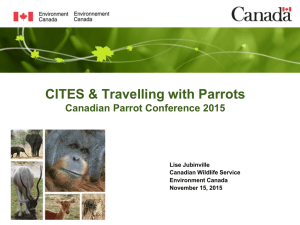Doc - Cites
advertisement
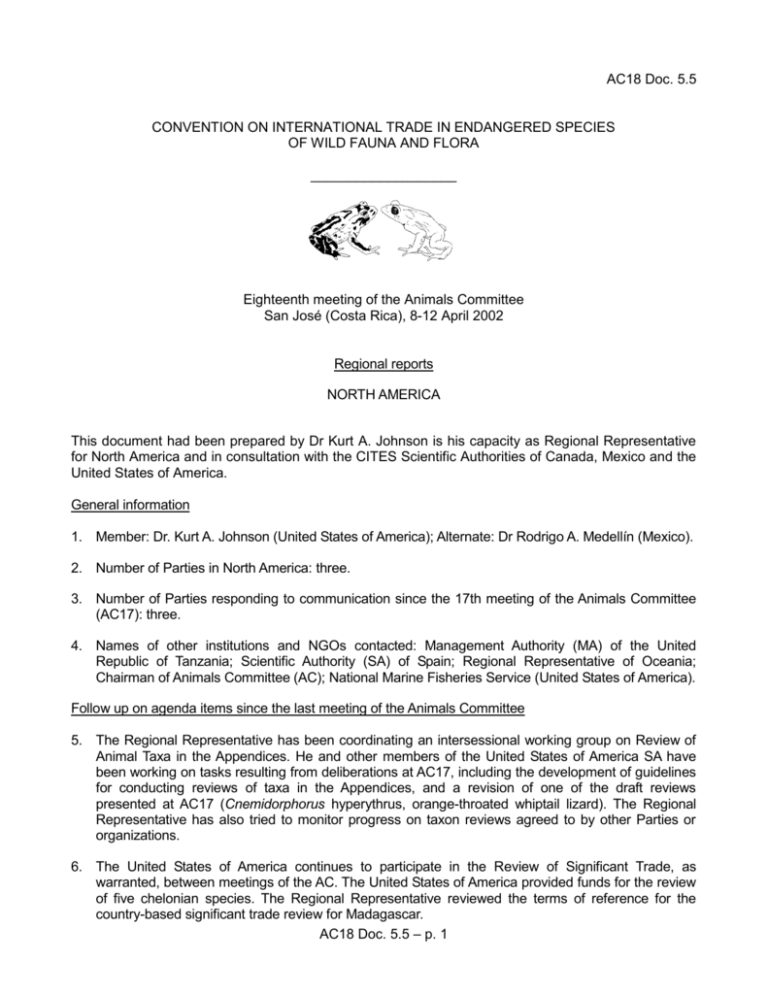
AC18 Doc. 5.5 CONVENTION ON INTERNATIONAL TRADE IN ENDANGERED SPECIES OF WILD FAUNA AND FLORA ___________________ Eighteenth meeting of the Animals Committee San José (Costa Rica), 8-12 April 2002 Regional reports NORTH AMERICA This document had been prepared by Dr Kurt A. Johnson is his capacity as Regional Representative for North America and in consultation with the CITES Scientific Authorities of Canada, Mexico and the United States of America. General information 1. Member: Dr. Kurt A. Johnson (United States of America); Alternate: Dr Rodrigo A. Medellín (Mexico). 2. Number of Parties in North America: three. 3. Number of Parties responding to communication since the 17th meeting of the Animals Committee (AC17): three. 4. Names of other institutions and NGOs contacted: Management Authority (MA) of the United Republic of Tanzania; Scientific Authority (SA) of Spain; Regional Representative of Oceania; Chairman of Animals Committee (AC); National Marine Fisheries Service (United States of America). Follow up on agenda items since the last meeting of the Animals Committee 5. The Regional Representative has been coordinating an intersessional working group on Review of Animal Taxa in the Appendices. He and other members of the United States of America SA have been working on tasks resulting from deliberations at AC17, including the development of guidelines for conducting reviews of taxa in the Appendices, and a revision of one of the draft reviews presented at AC17 (Cnemidorphorus hyperythrus, orange-throated whiptail lizard). The Regional Representative has also tried to monitor progress on taxon reviews agreed to by other Parties or organizations. 6. The United States of America continues to participate in the Review of Significant Trade, as warranted, between meetings of the AC. The United States of America provided funds for the review of five chelonian species. The Regional Representative reviewed the terms of reference for the country-based significant trade review for Madagascar. AC18 Doc. 5.5 – p. 1 7. The United States of America remains active in the intersessional coral working group, which is addressing several issues in the stony coral trade such as characterizing exempt fossil corals and identifying taxa that cannot be recognized easily at the species level. 8. The United States of America continues to participate in an intersessional working group on seahorses and other syngnathids. This working group is charged with implementing Decisions 11.153 and 11.97 regarding analysis of biological and trade data on these taxa. The United States of America has provided financial support, through the U.S. State Department’s voluntary contribution to the CITES Trust Fund and the National Marine Fisheries Service, for the proposed technical workshop on syngnathid trade to be held in 2002. A representative of the United States of America plans to participate in the workshop. 9. The United States of America continues to participate in an intersessional working group on freshwater turtle and tortoise trade. The United States of America has provided financial support for the proposed technical workshop on the turtle trade to be held in China in March 2002. The Regional Representative and a representative of the United States of America hope to participate in the workshop. 10. The United States of America was asked to coordinate a small contact group of cetacean experts to analyze the trade and taxonomic status of the Black Sea bottlenose dolphin, Tursiops truncatus ponticus. The U.S. Scientific Authority and National Marine Fisheries Service (NMFS) prepared a document for consideration at AC18. NMFS personnel are currently attempting to expedite the transfer of genetic samples from range States for analysis. Regional CITES meeting in Mexico 11. In late April 2002, the Scientific and Management Authorities of Canada, Mexico, and the United States of America will participate in the CITES Working Table of the 7th Annual Meeting of the Canada/Mexico/United States Trilateral Committee for Wildlife and Ecosystem Conservation and Management (the Trilateral) to be hosted by Mexico in Nuevo Vallarta, Nayarit. The CITES Working Table will provide an opportunity to exchange information and coordinate within the region on a wide range of CITES issues. A workshop for North American SAs will be held one day prior to the Trilateral. Other activities in the region 12. Canadian federal CITES Authorities organized a national CITES workshop in November 2001 in Ottawa that included all Canadian Management, Scientific and Enforcement Authorities. Federal, Provincial and Territorial Agencies were represented, including Fisheries, Forestry, Customs and Plant Inspection. CITES implementation experiences and difficulties were discussed. A special focus was put on collection of scientific data on native CITES-listed species in order to provide better NonDetriment Findings (NDF). The checklist for NDFs was also explained to all agencies involved and it was decided to test the checklist at national and provincial levels with selected pilot species. Other items discussed were improvement of coordination at the national and regional level, better implementation of the permit issuance system, the registration of captive breeding operations and scientific institutions, and communication. The meeting was a success and will be reconvened annually. 13. The Canadian SA, in collaboration with the MA and Enforcement, organized a complete redesign of the content and look of the Canadian bilingual (English-French) CITES website. The main goal is to explain how CITES is implemented in Canada, how it works in general, and what permits are needed and where people can apply for them. Plans for the future include translation into Spanish, AC18 Doc. 5.5 – p. 2 on-line permits applications (later on-line permits issuance), Canadian CITES species database, and a kid’s corner. The site can be accessed at www.ec.gc.ca (or www.cites.ca). 14. Environment Canada – with the cooperation of the CITES Secretariat, the Ministère de l’aménagement du territoire et de l’environnement, Direction de la nature et des paysages (France), TRAFFIC Europe, and the Rufford Foundation – has published a new Guide on Sturgeons and Paddlefish as part of its series of Identification Guides (e.g. on crocodilians, butterflies, and turtles and tortoises). The Guide includes species descriptions that will allow officers at the borders to identify the species, and also provides information on different types of caviar, common names, and species distribution. (See Notification to the Parties No. 2001/094.) 15. The United States of America is actively engaged in the implementation of Decision 11.2 regarding the review of the criteria for amendment of Appendices I and II (Resolution Conf. 9.24). Most recently, the United States of America provided comments on the report of the Chairmen of the Animals and Plants Committees and the Chairman of the Criteria Working Group, as requested in Notification to the Parties No. 2001/37. 16. Mexico and the United States of America, who had attended the First CITES wider Caribbean hawksbill turtle (Eretmochelys imbricata) dialogue meeting, in 2001, participated in two teleconferences of the subgroup on monitoring protocols, arranged by the CITES Secretariat. Both Mexico and the United States of America will participate in a meeting of the Monitoring Subgroup scheduled for February 2002 in Miami, and both will participate in the Second wider Caribbean range States hawksbill turtle dialogue meeting, scheduled for 21-23 May 2002 in Grand Cayman. AC18 Doc. 5.5 – p. 3
